Reducing Excess Nutrients Research Pilot
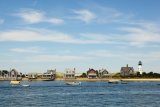
- Environmental Challenges
- Partnerships and Project Focus
- Anticipated Results
- Pilot Project Research Activities
- Project Fact Sheets
- Project Publications
Evaluating Non-Traditional Approaches for Reducing Excess Nutrients Entering Cape Cod's Coastal Waters
EPA is collaborating with partners and stakeholders in the Cape Cod region to explore ways of reducing the amount of nutrients, specifically nitrogen, entering the Cape's estuaries and freshwater ponds to protect coastal waters. Excess nutrients from human activities are an increasingly serious threat to estuaries, wetlands, and freshwater ponds nationwide, as they contribute to algae blooms; low dissolved oxygen; degradation of seagrass; impaired freshwater and estuarine ecosystems; and, in extreme cases, fish kills.
Environmental Challenges in the Cape Cod Region
Although nutrients, such as nitrogen, are a natural part of aquatic ecosystems, excess amounts can cause water systems to become polluted. Cape Cod has several unique characteristics that make its estuaries susceptible to impacts from excess nitrogen.
Due to the costs and challenges associated with widely distributed housing and large seasonal fluctuations in population due to summer tourism, centralized wastewater treatment plants are not widely used on Cape Cod. An estimated 80 percent of nitrogen loading on Cape Cod stems from the use of traditional backyard septic systems, which are not designed to remove it.
Nitrogen moves easily from the septic systems to the Cape’s groundwater, where it is transported to ponds, streams and estuaries. In addition, lawn fertilization, atmospheric deposition, and stormwater also contribute to excess nitrogen.
Partnerships and Project Focus
EPA scientists are partnering with the Barnstable Clean Water Coalition (BCWC), U.S. Geological Survey (USGS), The Nature Conservancy, and the Massachusetts Alternative Septic System Test Center and are engaging additional local and state stakeholders to examine ways to reduce excess nitrogen.
- Barnstable Clean Water Coalition
- U.S. Geological Survey
- The Nature Conservancy
- Massachusetts Alternative Septic System Test Center
- Massachusetts Department of Environmental Protection
- Massachusetts Division of Ecological Restoration
- Town of Barnstable
- Cape Cod Commission
These partners are exploring both traditional technologies, such as centralized wastewater treatment facilities, and alternative technologies, such as enhanced septic systems, to reduce excess nitrogen. An initial stakeholder engagement and problem formulation workshop revealed key knowledge gaps and opportunities for collaboration.
Anticipated Results
- Results will provide information needed on the effectiveness of alternative technologies for removing nitrogen from Cape Cod’s waters and to understand which solutions work best for the region.
- Results will ultimately be used to assist Cape Cod communities with evaluating the benefits and tradeoffs of implementing different nitrogen removal technologies.
Pilot Project Research Activities
Based on insights from an initial stakeholder engagement and problem formulation workshop, the collaborative research activities below have been started as part of the overall pilot project. Learn more about these activities and get updates
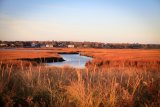
Innovative/Alternative Septic Systems Research Pilot and Demonstration
Designing a neighborhood-scale innovative/alternative septic system experiment to field test new and enhanced low-nitrogen septic system designs and demonstrate resulting changes in groundwater nitrogen levels. In addition, the factors that influence social acceptance of these nitrogen-reducing systems are being evaluated.
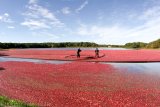
Cranberry Bog Research
Evaluating the nitrogen reduction potential of various cranberry bog wetland restoration approaches.
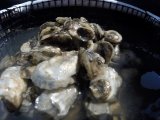
Aquaculture Research
Investigating the benefits of improved water quality provided by shellfish aquaculture. Oysters and other shellfish filter water, consume phytoplankton, and remove nitrogen from the environment
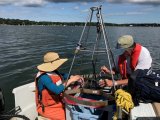
Benthic Conditions Survey
Conducting a benthic survey of the Three Bays estuary in Barnstable to determine the current condition of the estuary, which includes North Bay, West Bay, and Cotuit Bay.
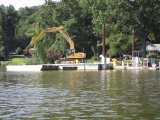
Reuse of Dredged Material Research
Performing greenhouse experiments to investigate the potential reuse of nitrogen-rich sediments dredged from nearby ponds and the Three Bays estuary.
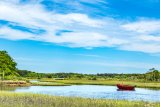
Recreational Benefits of Improved Water Quality Research
Comparing the ecological, economic, and social benefits and barriers of the various alternative technologies
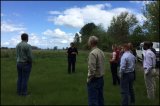
Stakeholder Engagement
Evaluating how increased stakeholder engagement can improve research planning and outcomes.
